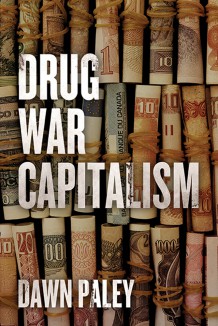 Dawn Paley is one courageous journalist. Her travels through Mexico, Colombia and Central America have brought her to the frontlines of "drug war" danger and militarization, producing first-hand reportage from communities terrorized by narco-gangs, paramilitaries and "official" security forces alike. In Drug War Capitalism (AK Press, Oakland, 2015) Paley portrays these forces as constituting a single nexus of terror, thoroughly integrated into the structures of the "legal" economy.
Dawn Paley is one courageous journalist. Her travels through Mexico, Colombia and Central America have brought her to the frontlines of "drug war" danger and militarization, producing first-hand reportage from communities terrorized by narco-gangs, paramilitaries and "official" security forces alike. In Drug War Capitalism (AK Press, Oakland, 2015) Paley portrays these forces as constituting a single nexus of terror, thoroughly integrated into the structures of the "legal" economy.
In what others have called the "balloon effect," big US-directed anti-drug initiatives have (at best) moved the problem around. Paley quotes William Brownfield of the US Bureau of International Narcotics & Law Enforcement admitting: "Just as Plan Colombia helped push the focus of criminal activity and presence north to Mexico, so has the impact of the Merida Initiative pushed the same activities into Central America itself." Now the vicious cycle is set go 'round again with the Central American Regional Security Initiative, or CARSI.
Paley reports from the places affected by these policies, in the mountains and jungles of Latin America. She depicts the same fundamental structure of oppression in the "Drug War" as in the Cold War that preceded it and the "War on Terrorism" that is now augmenting it. Whether the enemy is leftist guerillas or narco-gangs, goons with guns are useful in terrorizing peasants struggling to protect their lands from oil and mineral exploitation. So there is an inevitable intersection between the "drug war" militarization and corporate power. Paley provides examples from Putumayo to Chihuahua.
And of course the narco-gangs themselves intersect with the state apparatus that ostensibly opposes them. Here's where Paley may oversimplify a bit, portraying the cartels as in league with regional governments, as opposed to a web of shifting alliances. She writes that Mexico's blood-drenched narco-paramilitary network, the Zetas, has "deep roots in state military structures," and notes that many of their gunmen are veterans of elite special forces such the Mexican GAFEs and Guatemalan Kaibiles. But are the Zetas really on the "Colombian model" of paramilitarism? Paley doesn't emphasize that the Zetas resort to such ultra-violence because they are now at war with the Mexican state, while their rivals in the Sinaloa Cartel appear to enjoy a degree of state protection, and can therefore afford a more businesslike style.
On the other hand, Paley is perhaps too quick to dismiss the possibility that the anti-narco "self-defense" groups that have emerged in southern Mexico can be manipulated into a paramilitary force on the Colombian model.
Paley notes that Colombia's FARC guerillas were added to the US list of "terrorist organizations" in 1997, and goes on to show how they've been portrayed since then as a "narco-terrorist" force controlling a big chunk of the cocaine trade. She argues that that the "narco-terrorist" label is better applied to the FARC's bitter enemies, the right-wing AUC paramilitary network, which often collaborated under the table with oil and banana interests. She doesn't note that the AUC itself was added to the State Department list in 2002, and many of its leaders are wanted by the US on trafficking charges. She also perhaps overstates the continuity between the old para network and the neo-paramilitaries (dubbed Bacrim, or "criminal bands") that have survived the official "demobilization" of the AUC in 2006. The Bacrim may be just as ruthless as the AUC, but probably don't have the same degree of clandestine support from the "official" armed forces.
Paley writes early on that the "drug war has designs other than stopping the flow of narcotics." She later identifies these designs as "appropriation of land and territory." But this function may be inherent to the structure of the hemispheric "security" architecture, rather than a conscious "design." Many of the drug war architects may suffer from enough doublethink to believe their own rhetoric. Nor is this comforting. We ultimately have more to fear from zealots than cynics.







Recent comments
2 weeks 3 days ago
2 weeks 4 days ago
5 weeks 4 days ago
6 weeks 4 days ago
10 weeks 4 days ago
14 weeks 2 days ago
18 weeks 3 days ago
19 weeks 1 day ago
29 weeks 1 day ago
33 weeks 1 day ago